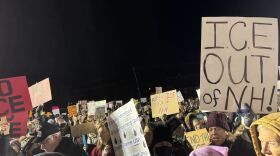Among the slate of economic measures state lawmakers will consider next session is a bill to impose an income tax. The sponsor is well aware of what he’s up against.
“I know that proposing an income tax has political baggage with it. I accept that,” says Paul Henle, a third-term Democrat from Concord. “But so be it. This is something we have to do.”
New Hampshire lawmakers have long rejected a broad-based income or sales tax. Each political season, candidates on both sides of the aisle routinely pledge to vote against such a measure.
But Henle says the way New Hampshire currently raises its money is no longer viable. His proposal would dramatically slash both business taxes and state property taxes, and instead impose a 3.95% income tax on residents. He says last year’s business tax breaks, a politically divisive issue that put the state budget on ice for months, didn’t go far enough.
“They need to be significantly lowered if we are going to attract businesses here and enable businesses that are here to expand.”
Henle argues his plan, dubbed the ‘New Hampshire Tax Shift,’ would be revenue neutral, and provide much needed property tax relief. And he says it won’t grow the size of government.
“We are a very frugal state,” says Henle. “We have small government here in New Hampshire, and we want to have small government. My bill does nothing to change that.”
The plan faces an uphill battle. Governor-elect Chris Sununu, like his predecessor Maggie Hassan, pledged to veto any statewide sales or income tax.








